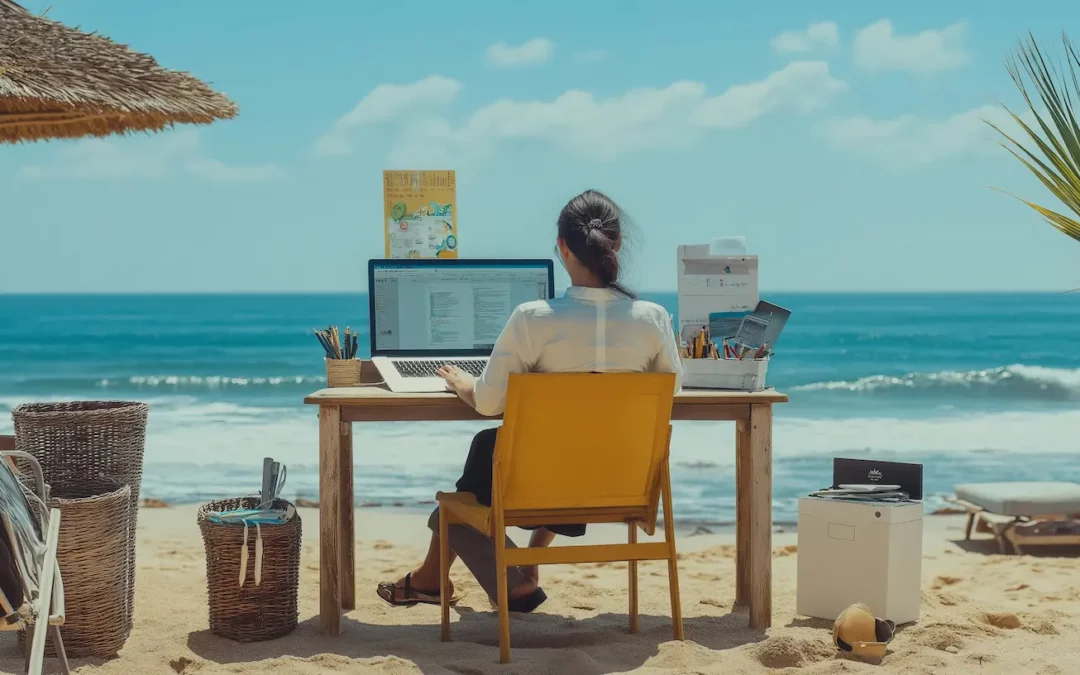Returning to Work After Vacation: How to Transform ‘Have To’ into ‘Want To’ | A Psychological Approach
Introduction: Recognizing the Universal Experience
The alarm clock chimes on that first Monday morning post-trip, and you feel the familiar flood of reluctance. You can’t help but wish you were back on that sunny holiday, a more leisurely morning coffee and not a schedule or deadline to adhere to. This feeling of post-vacation blues is so commonplace that psychologists have coined a term for it: post-vacation syndrome, which affects roughly 64% of workers, according to a recent workplace study conducted in Europe.
But what if this tough change of scene might hide a silver lining? What if working again did not only has to be sufferance but rather a source of a psychological well-being, individual development and authentic satisfaction? By learning the psychology of our resistance and the surprising ways in which our preferences are shaped by culture, we can reframe our attitudes toward work and learn what this kind of life can give us that we could not have at home.
The transition from summer rest to back-to-work needn’t be a rude awakening. It doesn’t have to be forced; it can be a mindful shift that respects both our need to rest and our equally essential need for structure, achievement, and socializing. The psychological approach to coming back from vacation isn’t just a menagerie of coping strategies; it’s a deep reframing of how we think about our professional lives and our day-to-day routines.
Why It Feels So Hard to Go Back to Work, and How to Prepare for It: A Psychological Guide
The Neurological Shift
Our brains are eminently flexible machines that adeptly tune themselves to whatever environment we find ourselves flung into. When we are on vacation, neural pathways around winding down, responding spontaneously, and seeking pleasure get re-established. That prefrontal cortex, which normally does all the planning and decision-making on the job, is allowed to take a break. At the same time, the reward centers of the brain get used to vacation’s instant gratifications: sleeping late, doing new things, being free of responsibility.
When we come back to work, our brain has to quickly switch back to an entirely different mode of operation. This neural shift takes a lot of brain power — which is why the initial return to work is so tiring. Such disparity between the lowered cognitive load of vacation and the high demand of work is commonly referred to as a “cognitive dissonance” — psychological unease than can present in the form of reluctance, fatigue, and sometimes mild anxiety about returning to work after vacations.
Biorhythms and Circadian Disruption
Our bodies are governed by precise circadian rhythms that control sleep, energy and mood at different moments of the day. During vacation, as many of us cross time zones or just shed the routine altogether, those rhythms change. We tend to stay up later, sleep in, and not eat at regular times — not the case for everyone, but for most, this is how we function on vacation — all of which are a ton of fun when you’re not on the clock for work, but a problem if you slide back into being on said clock.
The hormone cortisol, which is responsible for helping us wake and feel alert, adjusts to our vacation pattern. When we have to suddenly return to waking up early for the week, our cortisol production is still on past-time, and we’re left feeling groggy, bleary-eyed and unmotivated. Likewise, melatonin production, which controls sleep, might still be running on vacation time, making it hard to fall asleep at work-night hours. This biological delay is largely to blame for not only post-vacation syndrome but also the struggles workers have managing work stress post-vacation.
Social and Cultural Expectations
Today there’s a weird relationship with work and play in Mediterranean societies like Greece. We’re also constantly informed that working hard equals good, and that we should “work to live, not live to work.” This result of cultural ambivalence generates what I term the ‘holiday weirdness’ of return. We’re supposed to feel grateful for time off, but also kind of guilty for dreading our return to productivity.
Social media has only served to amplify those contradictory messages. We witness other people who are still on vacation, while returning to our desks, which makes us feel envious and resentful. And we are constantly juxtaposed with idealised holiday experiences – our recent and our friends’ present of course – that all the humdrum of routine life seems so small. It is this social comparison theory, which is widely studied in workplace psychology, that helps to explain why returning to work can feel not only personally difficult, but socially isolating.
The Loss of Autonomy
One of the most powerful psychological forces behind post-vacation rut is the loss of freedom. We are in control of our own schedule, our lives, and we only answer to ourselves. This freedom resonates with a fundamental psychological need of ours — the need for autonomy, according to Self-Determination Theory.
Getting back to work and the reentry impact are yanked back to external demands, deadlines, and other people’s expectations. This move from intrinsic to extrinsic motivation can even be suffocating if we take our job to be something we like doing. The psychological reactance — the discomfort we inherently feel due to presumed limitations on our personal freedom — causes us to rebel against the very routines that, ironically, frequently give us structure and meaning.
The Subtle Psychology of Snapping a Ruler: Transcend Your Old Metrics
Routine as Psychological Scaffolding
Freedom is liberating on vacation but psychology research has demonstrated repeatedly that humans tend to do well in reasonable structure. Routine is our psychological scaffolding, buttressing our mental well-being in ways we often don’t consciously notice. Our brains can more efficiently deploy valuable cognitive resources when we know what our days will look like, shrinking decision fatigue and increasing some of the mental space that gets swallowed up by the stress and anxiety that has accompanied the pandemic.
This predictability generates what psychologists call “cognitive ease,” which is a place where our brains can run on full speed without too much effort spent on reflection. They help conserve mental energy that we’d otherwise spend hashing and rehashing basic decisions (when to wake up, what to do next, how to structure the day) and allow us to be able to use our powers of cognition for creativity, problem-solving, and deep engagement in our work. The work structure we begrudgingly push back on, allows for the higher-order thinking and more professional growth.
Research in occupational psychology shows that employees with predictable patterns experience less anxiety and a greater sense of satisfaction in their work. The structure does not limit us; it frees us from the wearisome need to constantly decide, instead allowing us the luxury of focusing on what matters in our professional development and personal growth.
The Role of Work in Meaning-Making
More than the structure, work has very high psychological utility: It gives people meaning and purpose. Viktor Frankl, influential psychiatrist and Holocaust survivor, names the pursuit of meaning the ultimate human search. You may have an especially frustrating job — we all have those days — but in that frustration are multiple channels of meaning-making that vacation, as pleasant as it is, can’t reliably spur.
Someone who’s making the world a better place with his work. Regardless of whether we are teaching students here in Chania, working with clients in Athens or building technology which lets people meet each other across Greece and beyond, our work always has positive social impact. This sense of contribution taps into what psychologists call “prosocial motivation” — which is the profound satisfaction that arises in people when they believe they are making a difference in the lives of other people.
Work also creates conditions for what Mihaly Csikszentmihalyi called “flow” — those periods of total immersion, when time seems to melt away and we are completely caught up in activity that is challenging and deeply meaningful. Holidays are for relaxation, work is for conquering and mastering and achieving. These kinds of experiences contribute to what positive psychology describes as “eudaimonic well-being” — the deeper sense of well-being and satisfaction that goes beyond just pleasure and is marked by self-realization and personal growth.
Social Ties and Workplace Social Relations
People are naturally social creatures, and the workplace is a unique social scene that, however much you love it, is difficult to replicate on vacation. Our colleagues are what sociologists call “weak ties” — relationships that are not as intimate as family or close friends, but offer certain key social benefits: varied perspectives, professional connections and the feeling of belonging to a larger community.
The daily activities in the workplace —quick greetings in the morning, side conversations around the coffee machine, problem-solving sessions at a shared computer—generate what researchers call “social capital.” It is a support network that comforts us when we are struggling, congratulates us when we are successful, and it is a community of which we are proud members and is part of who we are as professionals. Greek studies on the psychology of the workplace reveal that those who cultivate close friendships at work tend to be more satisfied with their lives and to suffer less from depression and anxiety.
The workplace also gives us the chance to “matter” — in the psychological sense of feeling like we make a difference to the world. According to Maslow, when coworkers depend upon our expertise (and personality, I assume) when they value our opinions or they just like to have our company, then we feel validated that we do matter more than the production we produce. And the social aspect of work is an important one for our mental state, providing for connections and community we can’t get from pure leisure over the long haul.
Growth via Challenge and Success
The stress at work, though it can be stressful, serves a useful psychological purpose. They challenge us to the point of discomfort, requiring us to learn new roles, think on our feet, and build our endurance. This process of confronting and surmounting challenges is crucial for what psychologists call “post-traumatic growth” — the positive psychological change that can occur as a result of struggling with life’s adversities.
Each one of our concert projects, every problem we solve, every goal we achieve builds our self-efficacy — our belief that we have the capacity to handle the problems, opportunities and challenges that lie ahead. This snowballing confidence doesn’t only serve us at work but also in other areas of our lives, rendering us better, stronger humans. The workplace is our personal development lab experimenting with controlled adversity from which we can grow without being destroyed in the process.
Realistic Tips for a Positive Return to Work
The Art of Re-engagement
Psychology recommends more of a wade back into work after a vacation rather than wading into work demands. This is essentially “systematic desensitization” from behavioral psychology and the idea of presenting work-related stimulus slowly over time to decrease anxiety and resistance. Begin by looking at emails for only half an hour on your last day of vacation, not with the intention of answering everything, but to get a sense of what you face.
Don’t do the most difficult things on your first day back. Start, instead, with common, familiar tasks that help to transition into work mode. Book key meetings for days two or three, allowing you to adjust mentally. This phased process honours your need to psychologically integrate, while also accomplishing work.
Consider using what occupational psychologists refer to as “transition rituals” — small, informal routines that you can use to mentally signal the end of vacation and start of work. That could mean tidying your workspace, reviewing your professional goals or having a special coffee with colleagues to swap stories from the break. These are psychological bridges, which help your mind move fluidly between different compartments of your life.
Bringing Aspects of Vacation to Everyday Work Life
The best way to deal with post-vacation is to incorporate vacation into your everyday. That does not mean turning work into a vacation; it means figuring out what it was that specifically made your time off restful and seeking ways to integrate this into your working life.
If vacation for you meant more time outside, try walking meetings or eating your lunch outside. If it meant taking on new experiences, pursue new projects or learning opportunities at work. If vacation gave you blocks of uninterrupted reflection, schedule “deep work” periods in your calendar throughout the year. That integration helps to blur the unforgiving line between “vacation self” and “work self,” and to make the working self a more holistic and fulfilling experience.
Small, frequent pleasures, research in positive psychology suggests, have just as much psychological worth as infrequent, intense ones. By seeding your work day with vacation moments — a mindful coffee break, a five-minute stroll, a gratitude pause for your setting in Chania or wherever you work — you’re producing what the researchers call “micro-restorations,” that keep well-being refreshed and renewed, without taking big blocks of time off.
Meaning and Purpose in Work: Reframed
The most effective way of doing that is to change the way we think about work. Instead of work being viewed as an interruption on life, it can be seen as a part of meaning in life. This is what is known in cognitive behavioral therapy as cognitive reframing, and it can make all the difference in how we experience the prospect of returning to work.
Begin by listing three ways in which your work makes a positive difference to other people. It can be essential services you provide, a beautiful product you’re making, or just bringing a little bit of positivity, every day, into an environment. Then, think of three ways that your work helps you learn and grow — skills you’re acquiring, relationships you’re building, goals or milestones you’re hitting. This act of meaning-making provides a reframe from “I have to work” into “I get to contribute.”
Keep a “work gratitude journal,” where you list one positive thing from your workday each evening. This practice, supported by a wealth of research in positive psychology, slowly rewires your brain to observe, and feel gratitude toward, the good parts of your job. Gradually, this changes your default so that rather than seeing work’s challenges you begin to see its opportunities.
Establishing New Goals and Welcoming New Challenges
It is a time that can help reveal what really matters to us. Leverage this knowledge to develop new professional goals that are in sync with who you are and what you desire. Maybe you discovered you desire cooler or more creative projects, better work-life balance, or chances for professional development. The post-holiday return is an excellent time to start those shifts.
Ask your manager for new tasks and projects that you are passionate about. Signup for continuing education courses that will broaden your skills. Find mentorship or be a mentor. By intentionally crafting your work experiences around your growth edges, you turn work from something you have to do into something you get to do. This proactive behaviour, based on self-determination theory, enhances intrinsic motivation and job satisfaction.
Building Sustainable Work-Life Integration
Stop thinking of work and life as two forces battling for your time and energy, and start seeing them as two sides of a fulfilling, well-rounded experience. This trend of moving from “work-life balance” to “work-life integration” is indicative of a psychologically healthier way of doing business. Work is structured, purposeful, and achieving; life outside work is restful, relational, and recreational. Both are essential to psychological health.
Have clear but porous boundaries between work and personal time. This could be a full disconnect from email conversations after a certain hour, yet also permitting yourself to leave early when personal issues need to be dealt with. This flexibility along with transparent communication about your boundaries sets, builds a sustainable cadence that prevents burnout and continues professional excellence.
Routine and the Supra-normality: Routine has a Therapeutic Value, and a Deeper Psychological Perspective for That
Routine as Anxiety Management
Routine is a great coping mechanism for a lot of people, especially for those with anxiety disorders. Predictability of routine lessens having to make tons of decisions all the time and lessens uncertainty (one of anxiety’s biggest catalysts). If we know what our day has in store, our nervous system is more able to keep a regulated state to buffer us against the physiological effects of anxiety.
This idea of the therapeutic nature of routine is especially applicable when it comes to returning to work after vacation. The freedom of school vacation feels relaxing at first, but prolonged lack of structure can heighten anxiety for some people. While it can be overwhelming, there is often a subtle sense of relief in going back to routine as we know what the day holds. That’s one reason so many people say they feel “more themselves” after a few days back at work: the routine has helped to keep their emotional and psychological state on an even keel.
The Daily-Regularity Doughnut
When managed effectively, our working patterns help support the best functioning of our circadian rhythms. Scheduled wake times, meal times, and sleep times enable our internal biological clocks to align with external requirements. This syncing isn’t simply a signifier of better sleep, but a booster of mood regulation, cognitive performance and even immune function.
Studies on chronobiology demonstrate that people with a stable daily rhythm have less mood fluctuations and enjoy superior overall well-being. The work week provides the external structure that protects these biological rhythms and keeps us in physical and mental health. Although the wide-open downtime of vacation seems freeing, reestablishing routine can actually be better for our bodies’ regulatory systems.
Professional Identity and Self-Concept
Our professional selves are a huge part of our personal identities. The occupations we contribute to at work as teachers, healthcare professionals, business owners or what have you, get absorbed into our identity. This professional identity brings coherence to our life story and serves as what psychologists refer to as “identity capital.”
And it’s that part of us that we have to return to after a vacation. Certainly, vacation lets us inhabit other aspects of our identity — traveler, relaxer, adventurer — but work returns us to our professional self. It is a difficult, but ultimately positive reunion. It’s such a nice way around us, our work, and our position in the profession.
Cultural Aspect: The Greek Perception on Work and Free Time
Mediterranean Work Culture and Well-being
The Mediterranean work-ology of life, and nowhere more so than in Greek culture, offers distinct wisdom as you make the turn from holiday to schedule. In contrast with the “live to work” attitude typical in some cultures, in Greece professional culture has typically been working to live — “kalò vioma”. This viewpoint can even make return to work feel easier, if you present it properly.
By realizing that work is a means to fund the life we desire—agreed: difficult, but possible—and not the life itself, we can alleviate some of the mental pressure we put on our professional identities. Instead, work is the means to an end — an instrument to build the life we want to live, to pay for future holidays, to provide for our family, to add value to the community that we are part of in Chania, Athens, Thessaloniki or wherever we are at home. This instrumental concept of work, notionally counterbalanced by acknowledgment of its inner satisfactions, establishes a more positive relationship with work.
Social Aspects of Greek Professional Life
The Greek approach to the workplace often puts more of an emphasis on relationships and social bonds than strict productivity. The coffee breaks, the chit chat, the celebrating of name days, the toasting of achievements — these social aspects mean that returning to work is more than a return to work, it’s a transition back to people. It’s returning to a community.
And social wealth of Greek working life can be used to help the transition back from holiday. So does reconnecting with co-workers, hearing vacation stories and rekindling workplace relationships which offer social rewards that are bone-stock to compensate for loss of vacation freedom. Work itself is transformed from more than a generic space for doing things and into a social space that is part of our general welfare.
When the Return to Work Is a Sign of Deeper Troubles
Recognizing Chronic Work Dissatisfaction
But if you’re dreading going back into the office and it gets progressively worse, that anxiety may be an indicator for long-term issues you need to address. If the mere thought of going back to work gives you massive anxiety, depression, or physical symptoms (say, insomnia or stomach issues), which it certainly should not, your reaction could be a sign of chronic work stress or job unhappiness, and a sign that your vacation was just a temporary escape, trapping the underlying problem — stress, dissatisfaction, or job-related illness — exactly where it had been before you left.
Your work might need adjusting if you have so much Sunday night anxiety that you can get only a few hours of sleep before the work week starts, have physical symptoms that occur only on workdays, feel inadequacy or futility in relation to your work, suffer from erosion of your workplace relationships or rely on substances to manage your stress. These symptoms would indicate that it’s not post-vacation syndrome, but more of a deep misalignment between your current work environment and your psychological needs.
The Importance of Professional Support
Occasionally, the blocker to returning to work is part of a bigger psychological picture that needs help from professionals. A psychologist who specializes in workplace issues can help determine whether your difficulties adjusting are temporary or are related to longstanding issues such as burnout, depression or anxiety disorders.
Online and professional psychological assistance can be useful by supplying tools to manage work-related stress, methods for cognitive restructuring, and suggestions for balancing work and private life. There may be some psychosocial added value for people in Greece in addressing also a psychologist who is acquainted with international evidence-based psychological practice, local culture and its impact. The cost of psychological services is a small investment that pays dividends in increased job satisfaction, more effective stress management and better life quality.
Changing Lens: From Perseverance to Participation
The Growth Mindset Approach
Acquiring what the psychologist Carol Dweck has called a “growth mindset” can alter the very nature of returning to work. Instead of dreading challenges at work, we can approach them as opportunities to grow. Every challenging job is an opportunity to grow our talents. And that growing closeness and increasing conflict are opportunities to develop emotional intelligence. Every time they fall short, it is another hard-knock lesson in resilience.
This change from fixed to growth mindset doesn’t deny the challenges of work but turns them into useful experiences in the service of our personal and professional growth. The return from vacation ceases to be a return to indolence, but a return to growth. This shift psychologically is known to increase job satisfaction, performance and happiness.
Creating Meaningful Milestones
A way that does work well, however, is setting a series of meaningful, work milestones throughout the year after returning from vacation. Because when work drags into an eternal expanse interrupted by only vacations, it’s better to split it up into smaller cycles of effort and reward. Design monthly professional goals with mini victories when met. Plan quarterly personal development objectives. Establish weekly rituals that recognize progress and offer mini-restorations.
These landmarks serve more than one psychological purpose. They offer structure and incentives, afford chances to accomplish and to celebrate, and segment the work year into digestible pieces. Based in goal-setting theory, this way you keep plugging away and grinding but avoid the feeling of soul-sucking robotic grinding without until it just becomes “work.”
Mindfulness Practices Integration
Mindfulness practices can change the experience of returning from a holiday for the better. Mindfulness, the practice of present‐moment awareness without judgment, enables us to be more fully present with our work and less stressed and more satisfied.
Some simple mindfulness practices at work include: taking three mindful breaths before beginning a task, eating lunch in silence without distractions, doing a walking meditation between meetings, or expressing gratitude for one aspect of your work each day. Research in workplace psychology backs up these practices, which can help simulate the presence and gratitude that many people feel while on vacation in the long hours of the workday.
Conclusion: Accepting the Pulsations of Work and Rest
The return from vacation doesn’t have to be a fall from paradise to purgatory. But we can also see it as an aspect of life’s natural rhythm — one that involves rest and (active) response, freedom and structure, leisure and purpose. Music, like life, demands both notes and rests in order to be a melody; so too with a full life, we need both the restoration of vacation and the contribution of work.
Our professional lives, when framed and focused on correctly, provide aspects of fulfillment that vacationing on its own does not: the fulfillment of contributing, growing through difficulty, finding the meaning in purpose, forming relations via collaboration. The return to work after vacations is not the abandonment of all good things but a new note added to life’s melody in a different but lovely key.
Attitude-psychological readiness Exercise #2: the psychological readiness to return to work. In this exercise we will consider Acceptance and Honouring of our first reaction, Resistance, as well as coming to comprehend the multi-level psychological benefits routine, order and the stimulation of professional engagement offer. It’s about taking the insights and restoration of vacation and integrating them into our working lives, for a more holistic and fulfilling professional existence.
As you work your way through your own re-entry process, remember that the transition is temporary, the benefits of engaged professional life are lasting, and there is no one right way to get there. The form you first rejected is soon going to seem to hold you up. Once more, the dull co-workers you dread to go back to will become your connection and collaborators. What obstacles appear insurmountable now will be challenges you overcame and accomplishments you achieved.
Onto the Next Stage: Professional Help to Manage Work-Life Transitions
And If you’re having trouble getting back into the swing of things at work longer than the typical adjustment period or want a more fulfilling relationship with your work, psychological support can help give you some useful tools and much-needed insight. You can achieve this by tapping into the experience of a psychologist who is familiar not only with the struggles associated with contemporary work culture but who also has the insight on the group of people working in Greece to give you customised tools to not only succeed in what you’re doing but also enjoy a healthy state of mind.
At PSYMT in Chania, we focus on professionally related issues, from post holiday settling-in to prolonged work stress to change in occupation. With evidence-based strategies tailored to your specific circumstances, we can help you re redefine your relationship to work, moving from drudgery to meaning and growth.
The transition from vacation to work doesn’t necessarily have to be a lonely one. With the proper perspective, tools and support, it can be a gateway to rebirth, expansion and uncovering a resting soulful satisfaction in your professional and personal life. The right rhythm of work and rest, when understood and embraced leads to a rich life, full of meaning and well-being.





